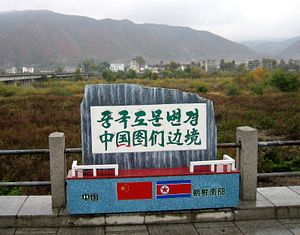Despite international efforts to tighten sanctions against North Korea, China has never fully participated, even though it vows to do so on the surface. One clear example are continuing news reports based on comments from witnesses and internal sources in China and the North that economic exchanges are still active between two countries — whether official or unofficial.
However, an interesting report emerged in June indicating that Beijing might be growing concerned about North Korean defectors living in China.
A source in China told Seoul-based online newspaper Daily NK that Beijing had strengthened its efforts to crack down on North Korea defectors flocking to China.
The source added that even brokers, who help North Koreans to defect in exchange for money, are reluctant to help defectors these days due to the rising number of arrest cases by the Chinese authorities.
The number of defectors increased notably in April and May last year when the weather became warm enough that people could cross the Yalu River or hide in the forest more easily, according to the source.
In response, Chinese authorities are reportedly working with some brokers while tracking the history of mobile phone usage to locate defectors, the source added.
Evidently, Beijing is eager to track down North Korean defectors and get hold of them, taking unusual efforts to do so. But what could be the motivation?
Another source in China told Daily NK that there had been an increasing number of cases of the Chinese authorities investigating defectors instead of repatriating them back to the North. The authorities even collect the personal details of defectors in a move to store and manage them as if they were Chinese citizens.
For instance, when the authorities in Liaoning province arrested and investigated a group of defectors, they took pictures and collected fingerprints, the source said, adding that their focus was on female defectors particularly.
The source explained that Beijing’s move came amid the increasing number of social issues in China caused by defectors, including cases where female North Koreans headed to South Korea after getting married in China to Chinese citizens. These women’s sudden departures to the South left broken marriages and children behind.
It is unclear how many North Korea defectors are hiding in China since the Chinese census does not recognize them, but some estimate the number as between 30,000 to 50,000.
Since China already has a huge ethnic Korean community numbering more than 2.5 million, however, defectors often blend in before heading to a third country such as South Korea.
It appears that Beijing wants to make sure it has a full grip on the defector community.
China recently issued an Internet Content Provider (ICP) certificate to four North Korean propaganda websites, namely Uriminzokkiri, Arirang-Meari, Ryomyong, and Ryukyong.
The certificate is issued and managed by China’s Ministry of Industry and Information Technology.
Having the certificate means these websites can be searched on the Chinese internet and online users in Chinese have unlimited access to them.
However, it also means that those websites are under the Chinese government’s monitoring.
One of the necessary steps to receive the certificate is to have a designated official with a Chinese passport to manage the website and have an on-the-ground office in China. Some reportedly acquire the certificate through a local partner. That means even the management of the websites could be overseen and controlled by the Chinese authorities to some extent.
Through such an arrangement, the Chinese authorities could point out and ask for a revision if anything sensitive relating to China is uploaded on the websites. That could be another way that Beijing can influence ethnic Koreans in the country, mainly with defectors in mind.

































